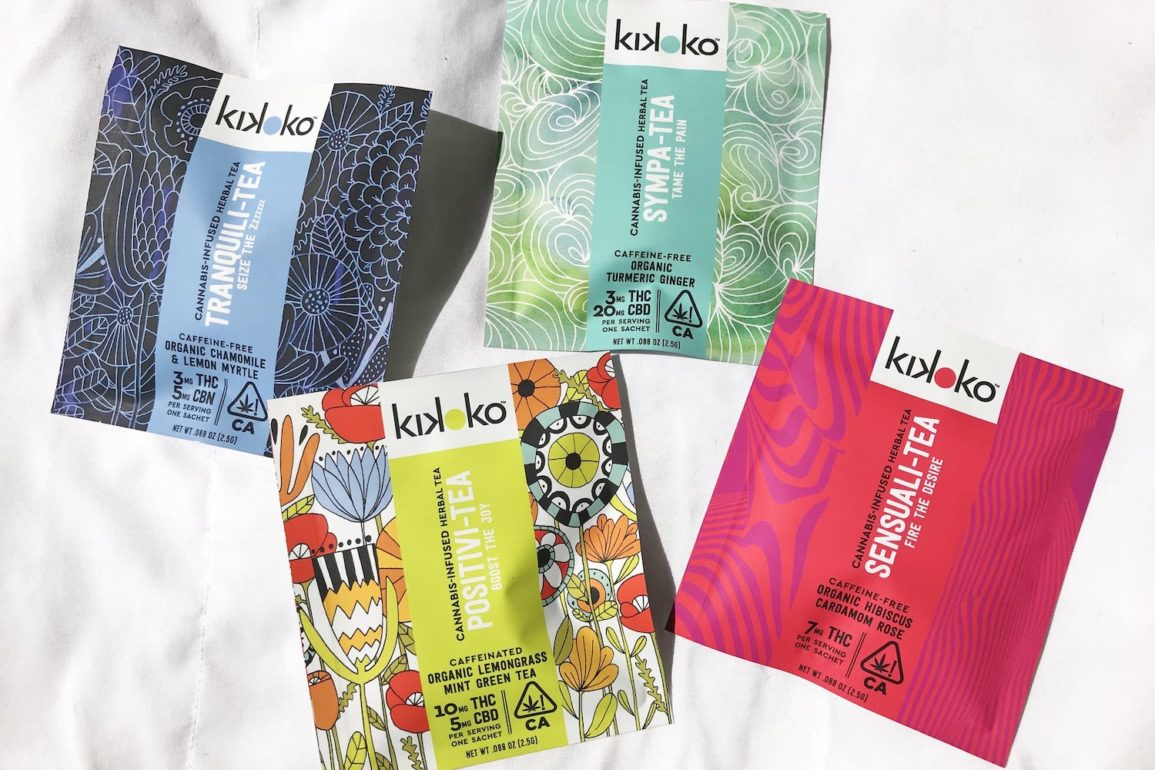CBD tea isn’t the most potent or effective CBD product out there. The strength options are limited to low levels of CBD (highest CBD content roughly 120-150mg). This is significantly lower than CBD oils, CBD capsules, and CBD vape oils.
Pair this with loss of CBD via the digestive system and you’d think it’s useless. It isn’t. In fact, it’s a very useful product to have in your CBD arsenal — if used correctly.
CBD tea is very natural. Loose-leaf hemp CBD tea doesn’t go through an extraction process. You get CBD hemp without any solvents or alcohols passing through it. The additional ingredients (chamomile, peppermint, etc) are also beneficial alongside cannabidiol and other cannabinoids, terpenes, flavonoids, and lipids.
Most users consume CBD tea for health and wellness reasons. It’s also a great social beverage as well (similar to regular tea).
Health and wellness benefits include relaxation, sleep (with chamomile or peppermint), anxiety (with spearmint or passionflower), and general physiological balance.
Hemp-derived CBD tea is federally legal (47 states allow its possession and use). Not difficult to get your hands on. Available in-store and online.
If you're looking to buy CBD tea, here are a few companies we recommend:
- Neurogan CBD teas
- Apothecary CBD teas
- Kikoko cannabis teas (in-stores)
- Atlas cannabis teas (in-stores)
What is CBD tea?
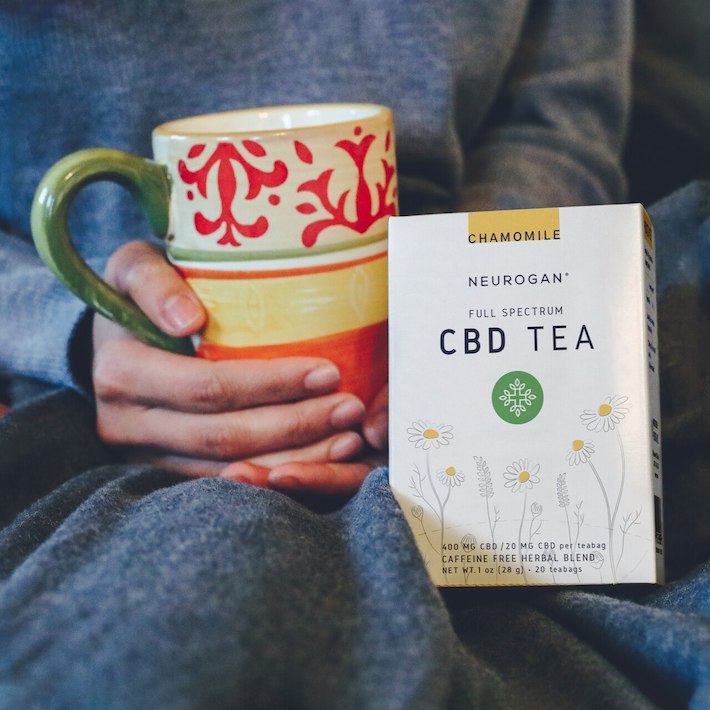
CBD tea (also known as hemp tea) is exactly what you imagine it to be: tea leaves infused with CBD hemp extract along with other ingredients commonly found in regular tea.
Other ingredients may include chamomile, peppermint, spearmint, lemon, etc.
Each additional ingredient has its own benefits and effects separate from CBD. Chamomile for relaxation. Lemon for vitamin C intake and lower blood pressure. Peppermint for improved digestion, oral health, and mood. Pair these with CBD’s mind and body effects and you’ll have a fantastic beverage, right?
How do you consume CBD tea?
The advantage of CBD hemp tea is it’s easy-to-consume. You drink it the same way you would regular tea. Simply put the CBD tea bag in hot water, stir, and drink. Make sure you leave the teabag in the hot water for a while to allow the CBD to fully absorb.
CBD tea uses and benefits
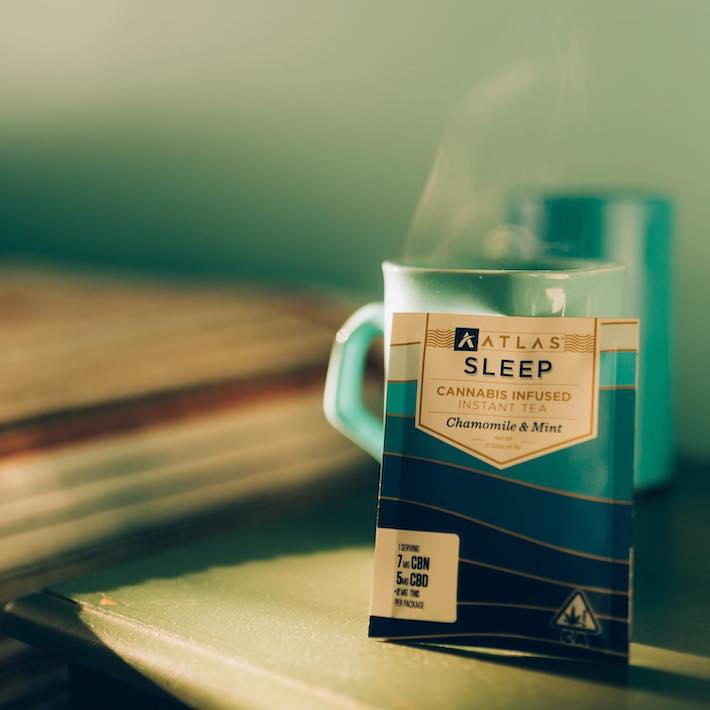
CBD teas aren’t really a viable option as a source of daily CBD intake. They’re more of a top-up of a stronger, more effective method of CBD delivery e.g. CBD oils, CBD capsules, etc. Can be consumed at any time of the day but best-used at nighttime.
We recommend CBD teas for the following uses:
- Warm, enjoyable beverage before bed
- Mild relaxation (paired with chamomile)
- Combating mild sleep issues (consumed with CBD capsules)
- Tackling mild pain symptoms (taken with CBD oils)
Additional ingredients to consider when purchasing CBD tea
- Chamomile — reduced blood sugar levels, anti-inflammatory, sleep-inducing
- Peppermint — soothes the digestive system, anti-nausea, increased focus & concentration
- Spearmint — anti-oxidant, stress-relief & sleep aid
- Lavender — mood-enhancer, sleep aid, anti-inflammatory, anti-bacterial
- Passionflower — anti-anxiety, sleep aid
- Lemongrass — antioxidant, anti-inflammatory, promotes digestive health, regulates cholesterol
- Ginger — blood pressure reduction
CBD tea disadvantages
Unfortunately, despite being a popular CBD beverage, CBD teas do have their disadvantages. They’re not the greatest source of CBD and don’t interact well in water (the main ingredient in CBD teas!).
We don’t recommend CBD tea products to anyone looking for something wholly effective. Instead, we suggest using CBD teas as a viable alternative to regular tea. Here’s why:
A. Lower CBD content
CBD tea isn’t strong, especially not when compared with high-strength CBD oils and CBD capsules. The most CBD we’ve seen in a single teabag is roughly 120-150mg. This is still lower than any CBD oil on the market. Certainly not the most potent or effective CBD product on the market.
If you’re a beginner, the higher end of the cannabidiol scale for CBD teas is sufficient.
B. Lower CBD absorption rate and bioavailability
The main disadvantage of CBD tea isn’t simply low cannabidiol content, it’s also the low absorption and bioavailability.
CBD is fat-soluble. Doesn’t dissolve or absorb via water very easily. Your entire body is made up of a high percentage of water. What does this equal? Poor absorption and equally poor bioavailability.
Studies suggest nearly 80% of CBD is lost via the digestive system, resulting in only 20% reaching the bloodstream. This is criminally low, to be honest. Read further on how to boost absorption and bioavailability.
C. CBD gets lost in the water you use for the tea
Again, CBD isn’t water-soluble. Hot water is used to brew tea (obviously). The problem here is the CBD gets lost in the water and rises to the surface, resulting in a tea resembling oil in a puddle.
It’s difficult to tell how much CBD is lost but we imagine it can be quite substantial if you don’t brew it correctly.
We recommend keeping the CBD tea bag in boiling hot water for at least 20 minutes, as opposed to dunking it for a few seconds and drinking it almost immediately.
How to improve your tea drinking experience
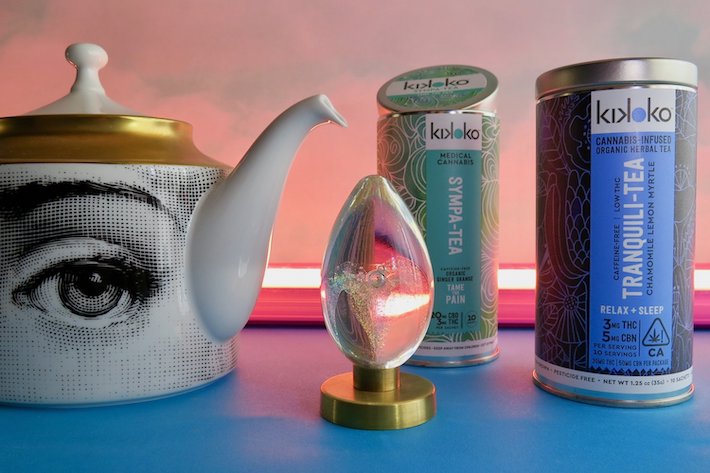
Because CBD is fat-soluble and doesn’t mix well with water, we recommend consuming it with fats. Adding milk or dairy products helps here. Drinking CBD while consuming fatty foods might be beneficial as well. Salmon, eggs, meats, etc, is optimal. This envelops the CBD extract into a self-made fat capsule causing an increase in absorption rate and, by extension, bioavailability.
Researchers believe eating fatty foods alongside CBD may increase absorption by up to 14 times.
CBD tea side-effects
CBD consumption may come with mild side-effects. None are life-threatening or long-term. The World Health Organization (WHO) deems CBD as perfectly safe for human consumption.
Common side-effects include:
- Fatigue
- Drowsiness
- Lethargy
- Dizziness
- Headaches
- Appetite changes
- Stomach problems (usually mild)
- Diarrhea
- Nausea (rare)
- Vomiting (rare)
Loose-leaf CBD tea vs. CBD tea bags
What’s loose-leaf CBD tea?
Loose-leaf CBD tea refers to tea not brewed in a tag bag pouch or container. The hemp buds and leaves are left free and, well, loose.
The tea buds and leaves aren’t ground-up to a dust-like consistency but, rather, partially cut, leaving sizable chunks. CBD extract is then infused into the loose leaves.
What are CBD tea bags?
CBD tea bags are self-explanatory. They’re tea held in tea bag containers or pouches. The tea buds and leaves inside are ground-up in a dust-like consistency. CBD hemp extract is then infused into it.
Which is better?
We prefer loose-lead CBD tea to its tea bag alternative. Here’s why:
- Loose-leaf allows better space for water absorption to expand the tea buds and leaves, resulting in a better, more enhanced flavor.
- Loose-leaf CBD tea can be used more than once. Tea bags are typically one-use (maybe two if you’re lucky).
- Better aroma and overall scent.
- Loose-leaf absorbs cannabidiol far more effectively — stays fresher for longer too.
- Loose-leaf CBD tea takes longer to brew.
Other CBD beverages to try
- CBD coffee
- CBD soda
- CBD syrup (with fruit juice or soda)
- CBD beer
- CBD wine
- CBD water
If you’re looking to buy CBD tea, here’s what to look out for
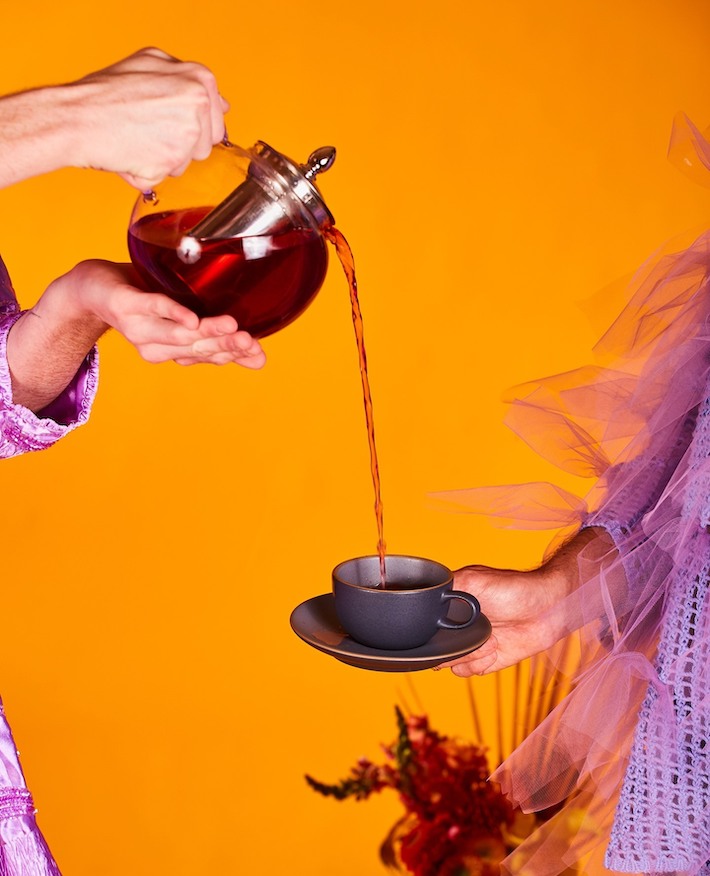
- Extraction process/method
Traditional hemp tea doesn’t require cannabidiol (and other cannabinoids, terpenes, etc) to be extracted from hemp. Instead, the chosen hemp is picked after harvest, dried, and then cured ready to be used as a loose-leaf product or placed in a teabag. No CO2, ethanol, or cold-press extraction methods needed. You get a very natural tea product.
However, some brands infuse CBD oil into tea. The advantage here is it gives both brands and customers the choice of isolate, broad-spectrum, or full-spectrum hemp extract, whereas traditional CBD tea only gives you whole-plant hemp “extract” (for lack of a better phrase).
The best CBD tea to purchase here is infused with CO2 extracted full-spectrum water-soluble “drops”. Better absorption. Enhanced bioavailability. Full range of plant compounds including THC.
- Hemp sourced from organic, non-GMO farms
We always make sure the hemp is sourced from organic, non-GMO farms based in the US. We’re a little cautious of hemp imported from international locations due to a loss of freshness when transported via plane for long periods of time. If CBD brands have connections with hemp farms or own the hemp farms themselves, that’s a huge bonus. More control from seed-to-sale.
- Third-party testing (COA)
Third-party testing is crucial. All legitimate brands will have their CBD tea tested by accredited, independent laboratories to make sure it’s uncontaminated and above-board legally, as well as carries the right number of cannabinoids and terpenes. Brands that don’t test their products should be avoided at all costs. Shows a lack of transparency and adherence to safety standards.
The way to make sure brands test their tea is via Certificates of Analysis (COAs).
- CBD content
Hemp tea isn’t the most potent product on the market. Strengths range from 5-120mg of CBD. 5mg is really not worth it. 120mg is suitable for subtle effects.
Our choice for both beginners and experienced CBD users is 100-120mg. Anything less probably won’t be effective enough. Still great flavors no matter which strength you choose.
- Loose-leaf or tea bag?
Loose-leaf is the preferred choice here. Fresher with a more rounded flavor and aroma. Keeps in-date for longer too. Generally a little more expensive than regular CBD tea bags. Why? Some brands tend to use leftovers as opposed to the best parts of the hemp plant/other ingredients. The flavor tends to be weaker and less enjoyable.
- Ingredients (peppermint, lavender)
Additional ingredients are important. When included, not only do you get the benefits of hemp extract (cannabinoids, terpenes, etc) but also other beneficial effects.
Chamomile, for instance, helps combat inflammation and soothes the body, etc. Always check the ingredients list on the product page. Make sure every ingredient is at least naturally-sourced with no synthetics used.
- Aroma
The aroma of CBD tea is fresh, natural, and, at times, quite therapeutic. A lemongrass-infused hemp tea should smell very much like fresh lemongrass. Not chemically or synthetic. Likewise, a lavender-infused hemp tea should smell exactly like fresh lavender you find outdoors (along with the other smell of ingredients too).
Poor-quality CBD hemp tea smells weak and subtle. No aromatic qualities at all. We recommend smelling the tea before use to determine its quality. You don’t have to hold your nose right up to the tea bag/loose-leaf. You’ll smell it instantly after taking it out from the box.
- Flavor
Similar to regular tea, CBD tea should burst with flavor. It should never be weak, subtle, or chemically. You want to look out for natural, refreshing flavors. The flavors, of course, ultimately depend on the ingredients used. There’s a slight hemp/weedy taste but this is typically masked by other flavors as well.

